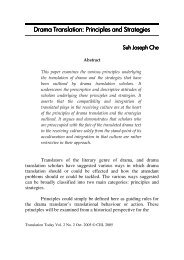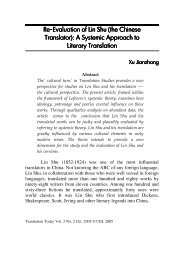Translation and Literary Genres: A Case Study of Poetry in Bengali ...
Translation and Literary Genres: A Case Study of Poetry in Bengali ...
Translation and Literary Genres: A Case Study of Poetry in Bengali ...
You also want an ePaper? Increase the reach of your titles
YUMPU automatically turns print PDFs into web optimized ePapers that Google loves.
<strong>Translation</strong> <strong>and</strong> <strong>Literary</strong> <strong>Genres</strong>: A <strong>Case</strong> <strong>Study</strong> <strong>of</strong> <strong>Poetry</strong> 119<br />
<strong>in</strong> <strong>Bengali</strong> <strong>and</strong> Marathi<br />
Checklist also <strong>in</strong>cludes other translations <strong>of</strong> the same work.<br />
Satyacharan Gupta, for example, calls his work Ekadhik Sahasra<br />
Rajani, a closer render<strong>in</strong>g <strong>of</strong> The Thous<strong>and</strong> <strong>and</strong> One Nights.<br />
III<br />
A study <strong>of</strong> some <strong>of</strong> the genres like the epic <strong>and</strong> the sonnet<br />
which were be<strong>in</strong>g appropriated by Indian writers reveals not only<br />
how genres change across cultures but also the fact that genres have<br />
a tendency to diffuse. Though generic formulations guide the process<br />
<strong>of</strong> creation <strong>and</strong> <strong>in</strong>terpretation, their universality can be questioned.<br />
S<strong>in</strong>ce the act <strong>of</strong> translation is <strong>in</strong> itself a culture-specific endeavour, it<br />
is reward<strong>in</strong>g to ask how one reconciles the universality <strong>and</strong> culturespecificity<br />
<strong>of</strong> generic translation.<br />
We may exam<strong>in</strong>e here the process <strong>of</strong> appropriation <strong>of</strong> the<br />
sonnet <strong>in</strong>to <strong>Bengali</strong> literature. Like many other terms current <strong>in</strong><br />
literary criticism <strong>and</strong> <strong>in</strong>dispensable on account <strong>of</strong> consequent<br />
convenience, the word ‘form’ presents difficulties <strong>in</strong> the way <strong>of</strong> a<br />
strict <strong>and</strong> logical def<strong>in</strong>ition. It has different shades <strong>of</strong> mean<strong>in</strong>g, <strong>and</strong><br />
to use it <strong>in</strong> any exclusive sense will not be correct. Applied to poetry,<br />
‘form’ may be <strong>in</strong>terpreted as the metrical pattern or frame <strong>in</strong> which<br />
words are set, the words themselves or poetic diction; the division<br />
<strong>in</strong>to stanzas; the division <strong>in</strong>to rhymed <strong>and</strong> unrhymed or blank verse<br />
<strong>and</strong> others. In this light, we would analyze the <strong>Bengali</strong> sonnet<br />
tradition., def<strong>in</strong>es a sonnet as “a poem consist<strong>in</strong>g <strong>of</strong> 14 l<strong>in</strong>es (<strong>of</strong> 11<br />
syllables <strong>in</strong> Italian, generally 12 <strong>in</strong> French, <strong>and</strong> 10 <strong>in</strong> English), with<br />
rhymes arranged accord<strong>in</strong>g to one or other <strong>of</strong> certa<strong>in</strong> def<strong>in</strong>ite<br />
schemes, <strong>of</strong> which the Petrarchan <strong>and</strong> Elizabethan are the pr<strong>in</strong>cipal,<br />
viz.:1) a b b a a b b a, followed by two, or three, other rhymes <strong>in</strong> the<br />
rema<strong>in</strong><strong>in</strong>g six l<strong>in</strong>es, with a pause <strong>in</strong> the thought after the octave (not<br />
always observed by English imitators, <strong>of</strong> whom Milton <strong>and</strong><br />
Wordsworth are prom<strong>in</strong>ent examples); 2) a b a b c d c d e f e f g g.<br />
The sonnets <strong>of</strong> Shakespeare are <strong>in</strong> the latter form.”

















